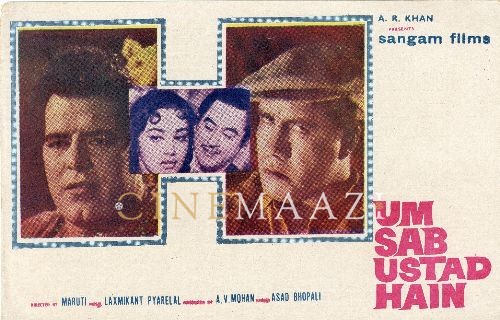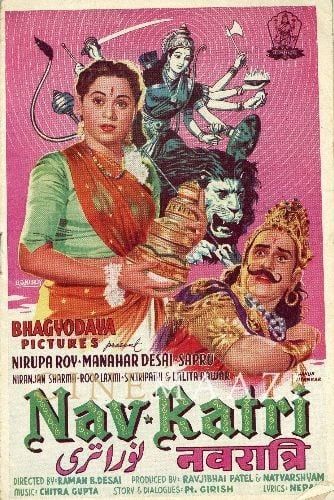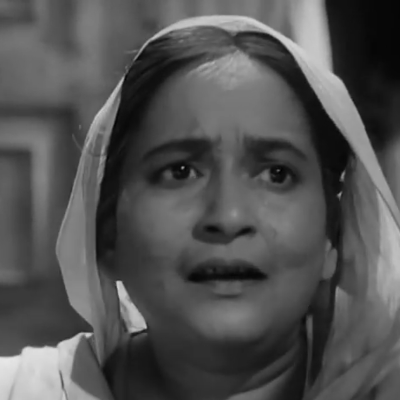Rafi Ajmeri

- Real Name: Ghulam Mohammad Rafiuddin
- Born: 1907 (Ajmer, Rajasthan)
- Primary Cinema: Hindi
Poet and writer Rafi Ajmeri is known for films such as Barsaat Ki Raat (1960), Anokhi Ada (1973) and Anpadh (1978). He was also a supporting actor and lyricist.
Born in 1907 in Ajmer (Rajasthan), he was named Ghulam Mohammad Rafiuddin. A poet, he penned nazms that became popular. One of his nazms reads:
Chhoti si burqa wali
wo dekho ja rahi hai chhoti si burqa wali
In the realm of films, he penned lyrics for the song Ae chaand tere saath to rahte hain sitare for the film Dada (1949), which also had songs written by Majrooh Sultanpuri, Shewan Rizvi, and Hussain Hyderabadi.
As an actor, he is also credited with featuring in minor roles in films such as Bachpan (1963), Hum Sab Ustad Hain (1965), and Dhoti Lota Aur Chowpatty (1975).
In his career as a writer, he penned the story of the P L Santoshi-directed Barsaat Ki Raat, which had dialogues by Sarshar Sallani and screenplay by Bharat Bhushan and P L Santoshi. The 1960 release, a romantic drama, starred Madhubala, Bharat Bhushan and Shyama in the lead. The story revolved around a poor poet/ singer, Aman Hyderabadi (Bhushan), who, amidst fierce qawwali competitions, falls in love with Shabnam (Madhubala), the daughter of police commissioner Khan Bahadur (K N Singh). After Aman is humiliated by Bahadur, Shabnam and Aman elope and travel to Lucknow. Here, Aman changes his name to Kamal Lucknowi and hopes to earn a living by singing. However, his voice gives him away and soon he will be hunted by a friend-turned-foe, Inspector Shekhar (Chandrashekhar Vaidya), who is determined to arrest him.
In 1968, Ajmeri wrote the additional comedy dialogue for Aulad, a comedy drama directed by Kundan Kumar. It starred Jeetendra, Babita and Mehmood. The plot revolved around a poor couple with two sons, Mohan and Sohan, the travails that beset them, and how the threads come together 17 years later.
Ajmeri would again pen the comedy dialogue for Kundan Kumar’s romantic drama Anokhi Ada (1973). Starring Jeetendra, Rekha and Vinod Khanna, the film told the tale of a ruthless gangster who schemes to win the affections of a timber merchant. Using lies, deceit and murder, he plots to take the place of the merchant's son, steal his inheritance and his girl.
The 1978 film Anpadh, had dialogues and screenplay penned by Ajmeri. A drama film directed by S M Sagar, it starred Ashok Kumar, Parikshit Sahni and Zarina Wahab. The plot revolved around Dr Gupta (Ashok Kumar), who is preparing to retire, and hopes to marry his daughter Jyoti (Zarina Wahab) to his associate Dr Anand (Parikshit Sahani). As Anand does not have time to romance or assist Dr Gupta on his large egg farm, he hires a college friend Mukesh (Vijayendra) as a property manager. Jyoti is entranced by Mukesh, and decides to marry him, much against her father’s wishes. Mukesh welcomes the opportunity to live the good life; however, he has a secret that he does not share with Jyoti – namely, that he is already married to Geeta (Sarika), whom he abandoned with a child when he found out she was ‘anpadh’ (illiterate). One night, Dr Gupta has an accident, injuring a woman named Geeta. He brings her home to recuperate. He goes on to teach her how to mingle in high society and dress and eat properly, and ensures the education of her son. In return for his decency and compassion, Jyoti prepares to marry Dr Gupta. When her father arrives for the festivities, he recognises Mukesh, and the truth is revealed.
In 1985, he penned the drama film Ghazal, produced by B R Chopra and directed by Rehman Naushad. It starred Shoma Anand, Sunil Dhawan and Iftekhar.
-
Filmography (3)
SortRole
-

Hum Sab Ustad Hain 1965
-

Bachpan 1963











.jpg)


